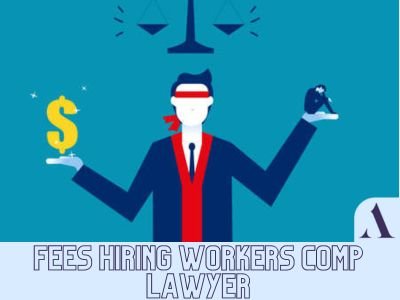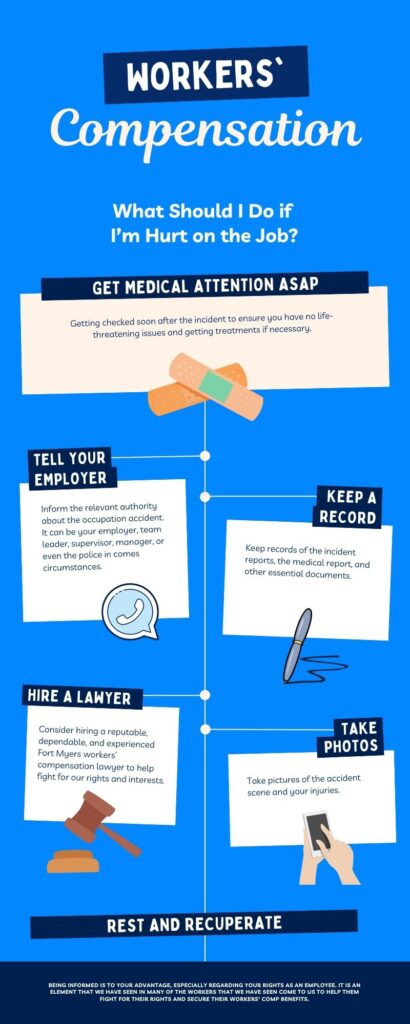Workers’ comp often known as workers’ compensation, is the term for the American system that offers financial and medical benefits to workers who get diseases or injuries at work.
In order to preserve their employees, the majority of employers are obliged to carry this type of insurance. When an employee gets hurt or ill at work, workers’ compensation is intended to pay for their medical bills, missed income, and rehabilitation expenditures.
A no-fault system where the emphasis is on helping injured workers is established when employees give up their ability to sue their company for the accident in exchange for these benefits. State-specific variations in workers’ compensation laws might result in variations in the particulars of coverage and benefits.
Speaking with a workers’ compensation attorney is frequently necessary when handling an injury sustained at work. On the other hand, there are some things to be mindful of that solicitors might not always talk about candidly.
Take a cup of coffee & read this full guide to know, What workers’ comp lawyers won’t tell you?
Cost of the First Consultation:
Not all lawyers provide a free initial consultation. Some could charge for the initial meeting. To properly manage your budget, it is advisable to find out this information in advance.
Contingency Fees:
The majority of workers’ compensation lawyers do not get paid until you win your case. However, their percentage may differ. The specifics of the contingency fee agreement must be understood.
Duration:
The workers’ compensation claim filing and resolution process might take a long time. It’s crucial to set reasonable expectations for the schedule because attorneys may not always stress the possible length of the case.
Alternative Dispute Resolution (ADR):
Although suing is a popular approach, attorneys might not highlight that ADR techniques like negotiation can provide quicker and more affordable resolutions.
Appeal Procedure:
Should your claim be turned down regretfully, there is a procedure for appealing that decision. The process of appealing a claim in denial should be explained to you by your attorney.
Documentation Importance:
The value of carefully maintaining track of your injuries, medical care, and associated costs is something that attorneys may not demonstrate enough. Your case’s outcome may be greatly impacted by these documents.
Return to Work:
Restarting your career following an injury might have an impact on your workers’ compensation benefits, which is something that attorneys might not completely explain. Having a thorough understanding of this shift is crucial.
Employment Affect:
Bringing a workers’ compensation claim may have an impact on your job position. Attorneys ought to provide clarity regarding the possibility of consequences, some of which may not be favourable to you.
Independent medical examinations:
An independent medical examination may be made by your employer’s insurance provider. It is possible that attorneys will not always fully prepare you for this important stage of the claim procedure.
Communication:
It’s important to communicate with your lawyer in an efficient and regular manner. It is sometimes not stressed by lawyers how important it is to keep them informed about any changes in your health, legal issues, or medical advancements.
When Should I Hire a Workers’ Compensation Lawyer?

If your workers’ compensation claim is presenting complicated challenges, you should think about speaking with a lawyer. You might not require legal counsel if your harm is modest and your claim is simple.
Nonetheless, it’s wise to have legal counsel if your claim is rejected, your benefits are delayed, you’re not getting enough medical care, your employer is taking unfair advantage of you, or you have a pre-existing illness that makes things more difficult.
Additionally, a workers’ compensation attorney can assist in ensuring you receive the amount you are entitled to and navigating the complexities of the legal procedure if your case involves a permanent disability, a significant change in your ability to work, or possible third-party responsibility.
In such circumstances, retaining legal counsel helps protect your rights and raises the likelihood of a favourable result.
What Can a Workers Comp Lawyer Do for Me?
It’s advised in some circumstances to hire a workers’ compensation attorney. If you have modest injuries, your case is simple, and it will take a little time away from work. You may be able to handle it without legal assistance.
It is advisable to obtain legal advice if your claim is refused, you are not receiving enough benefits, your injuries are severe, your employer is retaliating against you, or your pre-existing condition is making things more difficult.
In cases involving rejected claims or employer disputes in particular, lawyers can help you navigate the intricacies of the system, guarantee that you receive fair pay, and defend your rights. If you’re unsure if legal representation is necessary for your particular situation, speaking with a knowledgeable workers’ compensation attorney can help.
How do I find a reputable workers’ compensation lawyer?
Ask friends, family, or coworkers who have had good experiences with these lawyers for suggestions when looking for a trustworthy workers’ compensation lawyer. For a list of certified attorneys in your area, you can also get in touch with your neighbourhood bar organisation.
You may learn a lot about the qualifications of lawyers and their clientele by browsing online legal directories and review services. Seek out attorneys who have handled workers’ compensation cases in the past, and make sure they are familiar with the particular rules and laws that apply to your state.
Set up first consultations with the people on your shortlist so you can talk through your case and evaluate their experience and methodology. Selecting a workers’ compensation attorney who is good at communicating, upfront about costs, and truly committed to fighting for your rights is crucial in the intricate realm of workers’ compensation.
What questions should I ask during the initial consultation with a workers’ comp lawyer?
Make sure you ask a few important questions during your initial meeting with a workers’ compensation attorney so that you can make an informed choice. As regulations can differ by state, start by finding out about their background and level of skill in workers’ compensation claims.
Inquire about their payment schedule, percentage of charge, and if they operate on a contingency basis. Talk about how long your case will take on average and any viable settlement options, such as mediation, instead of going to court. Give clear indications about the frequency of updates on the status of your case and your role in gathering evidence.
Find out how they will communicate and whether they will be available. Lastly, ask previous customers for recommendations and learn how the attorney handles appeals or claims that are rejected. You may establish an open and honest working connection with them by asking these questions to determine whether they are a good fit for your particular circumstance.
What should I do if my workers’ comp claim is denied?
It’s critical to move quickly if your workers’ compensation claim is rejected. In order to navigate the appeals process, start by speaking with your workers’ compensation attorney, if you have one.
Should you be without legal counsel, ask your employer’s insurance provider to provide you with a formal justification for the rejection. Next, comply with the particular appeals procedure outlined in the workers’ compensation laws of your state.
To achieve this, you usually need to prepare for an administrative law judge hearing by obtaining any missing paperwork, medical records, or supporting proof. To improve your chances of getting the refusal reversed and receiving the benefits you are due, make sure to fulfil all dates and conditions strictly.
What are the typical fees associated with hiring a workers’ comp lawyer?

Typically, a contingency fee system governs the costs related to employing a workers’ compensation attorney. This implies that the attorney will only be compensated in the event that your lawsuit is successful and you win damages.
The proportion that they charge is normally based on the benefits or settlement you receive; this percentage can differ from one lawyer to the next, but it usually ranges from 15% to 25% of your rewards.
It’s crucial to go over the precise fee schedule in your initial meeting with your attorney to make sure you understand the terms and percentage they will charge. Furthermore, a free initial consultation to discuss your case and the price schedule is frequently provided by workers’ compensation attorneys.
Can I switch lawyers if I’m not satisfied with my current workers’ compensation attorney?
Sure, if you’re not happy with your present workers’ compensation lawyer, you can change. It is essential to bear in mind that you possess an obligation to select the legal counsel you feel most appropriate for your requirements. The following procedures can be used to change solicitors:
Inform Your Current Lawyer:
First, let them know that you have decided to part ways with your current lawyer. Often, you can accomplish this in writing.
Sign a new agreement:
After selecting a different attorney, go into a new legal agreement with them. Make sure you understand the associated terms and expenses.
Inform the Workers’ Compensation Board:
Depending on the state, you might have to let the workers’ compensation board or commission know that your representation has changed.
Transfer your case files:
Assist your new attorney with the transfer of all pertinent case files and information by working with both of your existing attorneys.
Ensure a Quick Transition:
Communicate your expectations and concerns to your new attorney and work together to ensure an effortless change.
It’s normal practice to change attorneys, and your new representative should help you navigate the process while making sure your rights and interests are protected.
What should I do if my workers’ comp claim is denied?

In the event that your workers’ compensation claim is rejected, take these actions:
Review the denial letter:
Examine the letter of denial. Examine the insurance company’s refusal letter from your employer carefully. It ought to provide justification for the rejection.
Speak with Your Attorney:
Speak with your workers’ compensation attorney right away about the denial, if you have one. They can offer direction and assist you in making decisions about what to do next.
Appeal Procedure:
Generally speaking, you are entitled to file an appeal against the denial. The particular appeal procedure and due dates must be specified in the denial letter.
Collect Evidence:
Collaborate with your attorney to obtain any further supporting documentation, witness accounts, or medical records.
Make an appeal:
Send in the appeal within the allotted time frame and in accordance with the guidelines. Add all pertinent papers and data.
Attend Hearings:
Get ready to show up to any meetings or hearings pertaining to your appeal. Throughout these proceedings, you may be represented by your attorney.
Preserve accurate documents:
Ensure that you have detailed documents of all your correspondence with the insurance company, as well as any bills associated with your injuries and medical care.
Follow medical advice:
Keep doing as your doctor advises and show up for all of your visits. This indicates how dedicated you are to getting better.
What is the difference between workers’ compensation and a personal injury claim?
The main difference between personal injury claims and workers’ compensation is how benefits are awarded to harmed parties. No matter who is at fault, workers’ compensation is a system intended to pay out benefits to people who sustain injuries at work.
Employees typically aren’t able to sue their employers for personal damage in exchange for benefits like medical care, wage replacement, and disability payments. On the other hand, a personal injury claim is a lawsuit brought by a person who has suffered harm as a result of the carelessness or misconduct of another individual, as in cases of slip and fall accidents or auto accidents.
By suing the accountable party, the injured party in a personal injury case can obtain damages such as lost wages, medical costs, pain and suffering, and other recompense.
Can I negotiate a settlement with the workers’ compensation insurance company without a lawyer’s assistance?
Indeed, you can settle your claim without a lawyer’s help by negotiating with the workers’ compensation insurance provider. But when you do that, you have to use caution. Insurance companies may attempt to give you a settlement that is less than what you deserve, as they frequently have skilled adjusters and legal teams working to defend their interests.
It’s important to fully comprehend your rights, the degree of your injuries and related expenses, and the workers’ compensation rules in your state if you decide to negotiate on your own. Even if you choose not to hire an attorney for the bargaining process, speaking with one can still be very beneficial and help guarantee that you get paid fairly for your missed wages and medical costs.
What is the statute of limitations for filing a workers’ compensation claim in my state, and how does it affect my case?
Each state has a different statute of limitations for bringing a workers’ compensation claim, but generally speaking, it lasts between one and three years from the date of the illness or injury at work. The laws in your state will determine the exact duration and regulations.
If you file after this deadline, you risk losing your right to benefits, which could have a serious impact on your case. It’s critical that you notify your employer of your injuries as soon as possible, get medical help, and speak with a workers’ compensation attorney to learn about the deadlines and particular criteria in your state.
Taking early action will guarantee that your rights are protected and that you have the best opportunity of getting the money you are due.

Conclusion
To sum up, workers’ compensation is an essential system in the US that offers financial and medical assistance to workers who sustain illnesses or injuries at work. While speaking with a workers’ compensation attorney is frequently essential while handling these claims, it’s crucial to be aware of crucial details that attorneys might not always be willing to address.
It’s critical to comprehend expenses, fees for contingencies, deadlines, alternative conflict resolution, the appeals procedure, paperwork, and the effect on employment. Hiring an attorney is advised if your claim becomes complicated, particularly if it is rejected, benefits are withheld, or you encounter difficulties with your employer.
Making the proper legal decisions, knowing your state’s statute of limitations, and selecting a trustworthy lawyer is crucial to guarantee that your rights are upheld during the workers’ compensation procedure.




